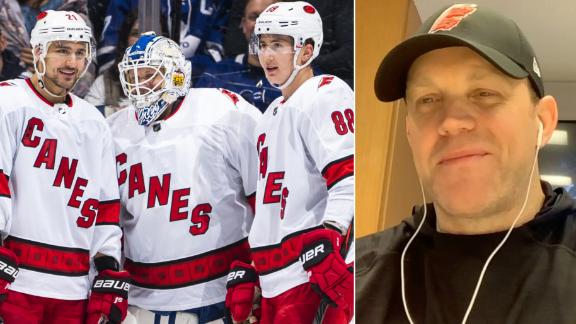What is an EBUG? What to know about NHL backup goaltenders

All 32 NHL teams play an 82-game regular-season schedule -- 41 games at home and 41 on the road. When at home, a team is required to maintain a list of local non-professional goaltenders who are available to either team in the event one or both of a team's regular goalies are injured or unavailable. Such goaltenders are known as emergency backup goaltenders.
Emergency backup goaltenders, or EBUGs, are rarely used in an NHL game. The life of an EBUG is often limited to watching the action from the stands and then returning to their full-time job. But a select few have been called into action.
David Ayres is the only EBUG to enter a game as a substitute and be credited with a win in February 2020. Ayres is also the oldest NHL goaltender to win a regular-season debut, emerging victorious at 42 years and 194 days old. For his stellar performance, Ayres even received a hockey card
Here are key facts to know about emergency backup goaltenders in the NHL:
What is an EBUG in the NHL?
EBUG stands for emergency backup goaltender. The player is not on a team's roster but attends all team home games and occasionally practices with the team. The goaltender is around in case either team loses its active goaltenders to injury, illness, suspension, etc., and needs a replacement.
Rules for an EBUG
Each NHL team must have one EBUG in the stands at every home game and have them be available to either team if a goaltender goes down.
An EBUG must not be under any type of professional goaltender services contract.
An EBUG can't be a paid team employee, understanding they could be called on to face the home team if needed by the visiting team.
An EBUG typically has playing experience at the professional, college or at least high school level.
An EBUG will be paid an hourly minimum for their time seated in the stands during the game.
An EBUG who is activated signs either an amateur or professional tryout contract and isn't counted toward the team's active roster.
Professional tryout contracts allow EBUGs to be paid $500 per game, and they're allowed to keep their game-worn jersey. Amateur contracts do not allow EBUGs to be paid or receive any bonuses. They just get to keep their jersey.
If activated for a game, most emergency goaltenders only dress to sit on the bench, as a team's regular backup takes over. In the history of the NHL, there have been only six instances in which emergency backup goalies have logged minutes in a game.
EBUGs who have played in a regular-season NHL game:
April 8, 2023
Jett Alexander (Toronto Maple Leafs) vs. Montreal Canadiens: no saves on no shots faced
Jan. 28, 2023
Matt Berlin (Edmonton Oilers) vs. Chicago Blackhawks: one save on one shot faced
April 29, 2022
Thomas Hodges (Anaheim Ducks) vs. Dallas Stars: two saves on three shots faced
Feb. 22, 2020
David Ayres (Carolina Hurricanes) vs. Toronto Maple Leafs: eight saves on 10 shots faced
March 29, 2018
Scott Foster (Chicago Blackhawks) vs. Winnipeg Jets: seven saves on seven shots faced
Dec. 31, 2016
Jorge Alves (Carolina Hurricanes) vs. Tampa Bay Lightning: no saves on no shots faced
Check out the ESPN NHL hub page for the latest news, analysis, in-depth player profiles, stats, schedules and more.br/]







